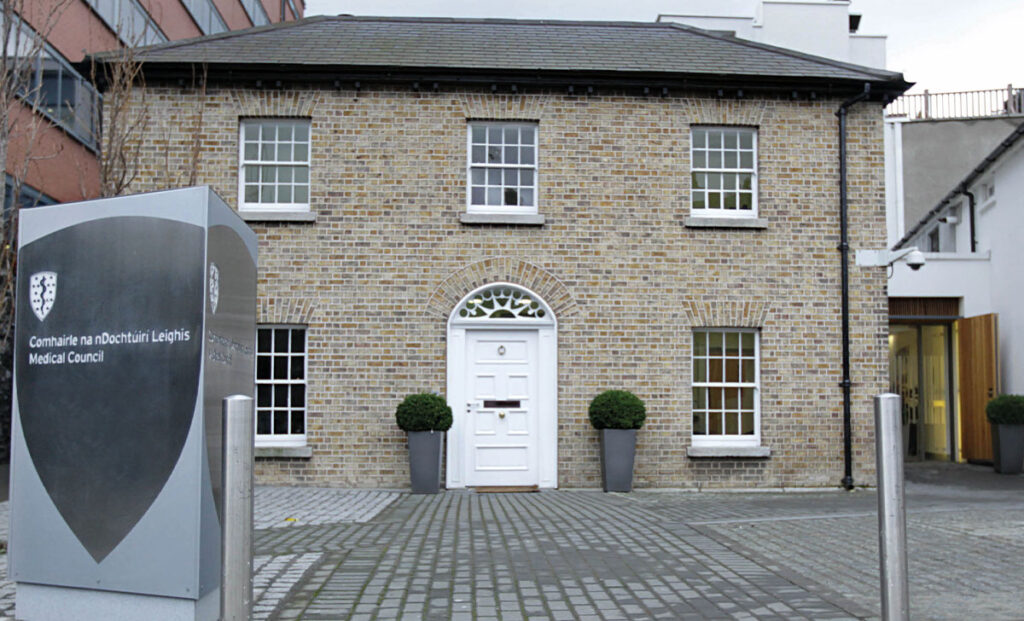Medical Council CEO Mr Leo Kearns speaks to Catherine Reilly about medicine’s workforce crisis and the significant upcoming changes in regulatory processes
A major shift in how the Medical Council investigates complaints against doctors, and a new model for maintaining professional competence, are on the near horizon for medical regulation in Ireland.
Overseeing implementation of these reforms and a wider “change programme” is Medical Council CEO Mr Leo Kearns, who took up post in April 2021. Mr Kearns will be known to many doctors as a former CEO of the RCPI. He came to the Council from Vhi Health and Wellbeing where he was Chief Operating Officer, and previously worked in the HSE as National Lead for Transformation and Change.

Workforce crisis
Mr Kearns knows the medical profession is facing several deep-rooted problems, including recruitment and retention, excessive working hours, burnout, and bullying. These issues have been documented in the Medical Council’s Your Training Counts surveys, workforce intelligence and training site inspection reports. Ultimately, however, these outputs have had a limited impact. How does the Council help address this?
“I don’t think we need a lot more data on this; we absolutely don’t,” Mr Kearns told the Medical Independent (MI). “I think what we need is an acknowledgement that we are in a workforce crisis; and why is that important? These are the people who are delivering the care to patients and I think maybe what we haven’t got across well enough in the past is just how deep this crisis is….”
The “markers” of the crisis included unfilled consultant posts, not enough doctors on training programmes, and the growth of the medical register’s general division. These problems have “been there for a long time”, he acknowledged.
“While we can focus on our regulatory role in relation to education and training, professional competence and providing ethical frameworks and managing complaints as they arise, it really is very clear to us that some of the more fundamental problems we have in the health service, directly related to patient safety, is our ability to recruit and retain a high calibre workforce, and for them to be working in a system that actually supports and helps them deliver care at the level people would expect,” surmised Mr Kearns.
The Council was “working very closely” on these issues with stakeholders such as the HSE, Department of Health and training bodies. In this regard, Mr Kearns emphasised the importance of a comprehensive medical workforce strategy.
He commented: “We need to see people within the Department, at Government level, HSE, clinical sites, training bodies, medical schools, Medical Council, other regulators, saying actually workforce is our fundamental issue – there are lots of other areas as well… but what we would be particularly focused on is the workforce because that is at the heart of safety and patient care so we have to get that right….
“And I have to say there is a strong sense emerging that people are beginning to take this very seriously. I would hope we are going to look back in two or three years’ time and say the reports are finally being acted on.”
There was “a reasonable chance we can get some meaningful action on this, and when I say meaningful action, it is at multiple levels”.
For instance, some findings from Your Training Counts related to the absence of “basic” requirements, such as timely receipt of rosters, access to lockers and food out-of-hours. “These things have to be addressed; they have to be sorted. It says something about how we value people… people need to see there is change at ground level….”
However, the Council holds significant powers as the accreditor of clinical training sites and training programmes – could it take stronger action on the problems identified during inspections, such as withdrawing accreditation temporarily?
“Well we wouldn’t take precipitous action,” stated Mr Kearns, who added “this is where right-touch regulation comes in”.
“There are a lot of good things going on across the health service. There are a lot of people doing great work, both management and clinical staff and so on, and you want to encourage that and facilitate that.
“I think the Council won’t be acting precipitously by any means, but we will be using our regulatory powers where we think we need to use them, to protect patients and to effect the kind of change that is needed; change in a more strategic way.”
Rebalancing the grade composition of the medical workforce was a fundamental requirement for the health service, indicated Mr Kearns.
“It is out of step with other comparable countries in terms of numbers of consultants per 100,000 of the population. It is out of kilter between the number of consultants and doctors in the general division, and so on.”
I think what we need is an acknowledgement that we are in a workforce crisis
He noted the lack of an overall plan that longitudinally examined medical school intakes, internship places, training places, and consultant post requirements.
“That actually was, believe it or not, a central recommendation in the Fottrell report [in 2006]… which said there needed to be joined-up thinking across education and health that was continually looking at the numbers and then taking actions in that context.”
One of the responses to the European Working Time Directive was recruiting more doctors onto the general division – “no joined-up thinking”, according to Mr Kearns.
The general division was “never intended to be as big as it is”, he said. In 2020 some 37.3 per cent of doctors were registered in the general division, with 42.7 per cent of doctors registered as specialists and 13 per cent as trainees.
“There is certainly a proportion of those on the general division who want to and absolutely are at the standard to be on a training programme. And as you know, some of the changes made last year [relating to residency stamp 4 holders] should help in that regard,” said Mr Kearns.
“But it is not addressing the overall problem, which is that from a workforce point of view, the ratio of consultants to NCHDs, and ratio of consultants to training scheme doctors and non-training scheme doctors, is way out of kilter with comparable countries.
“That then has an impact on the make-up of the team. It has an impact, we believe, on safety as well because on the general division, while there are many doctors on it who have excellent credentials and experience and so on, the baseline qualification to get onto the general division is an internship or equivalent….
“It is something we are looking at fairly intensively; we think it is part of the issue that has to be addressed in a workforce strategy. It is not going to be addressed in an isolated way, which I think has been a problem for many years.”
Investigations
A “major” focus for the Council is upcoming change in complaint and investigation management.
The Regulated Professions (Health and Social Care) (Amendment) Act 2020 has provided that the Council CEO will take on a new role in investigating complaints, with the assistance of ‘authorised officers’. The provisions aim to ensure a more efficient process. Currently all complaints are investigated by the preliminary proceedings committee (PPC), but it will have less involvement at an early stage under the new measures.
“It clearly places a much greater responsibility on the CEO and the office of the CEO to investigate and then bring the results of that investigation to the PPC,” explained Mr Kearns of the provisions, which are likely to be commenced in late 2022.
“That is a major focus for us at the moment and we have a major plan in relation to it. So we will absolutely need to put additional resources in… and we are working on that at the moment very closely with the Department.”
Implementing this reform would also involve “changing how we structure the whole function”.
“We are also looking at other areas we feel are quite important as well, for instance how do we triage queries and complaints coming in, so how do we make sure that we’re dealing with them in the most appropriate way.”
The Council needed to focus “the full weight” of its regulatory investigative function on serious patient safety issues. Mr Kearns said a significant number of complaints could be addressed at local level if there was a procedure for patients. The Council was working with various parties including the ICGP and HSE “to see how they can provide those kinds of [complaints] services and link people into it. There’s also the potential of using mediation or mediation services.”
The Council was also developing a “liaison-type service” for complainants and doctors, which would be separate to the complaints process. This service would provide people with further information about investigation and fitness to practise (FTP) processes and signpost support services for patients and doctors.
More broadly, Mr Kearns expressed concern about the length of the complaints process to completion. The Council will be looking at how to address this “while still making sure we are making the best decisions we can in the interests of patient safety”. According to internal Council documentation from April-May 2021, the median number of weeks from date of receipt of a complaint to PPC decision was 20.3 weeks in the previous 12 months. The median number of months from PPC decision to FTP committee inquiry was seven, and the median number of months from completion of FTP committee inquiry to a Council decision on sanction was 1.5 months.
Another area under the spotlight is undertakings. These are agreements by a doctor with the Council to remediate or cease some or all of their practice. Under the Medical Practitioners Act 2007 the FTP committee may accept undertakings from doctors, while undertakings may also be accepted by the High Court. The PPC will also be able to accept undertakings under the 2020 Act.
In late 2019 the then High Court President criticised the Council in the case of a doctor who had undertaken to its health committee not to practise medicine, but worked for a mental health service. Mr Justice Peter Kelly stated there was no way for patients or employers to find out about this undertaking to the health committee.
MI asked Mr Kearns which types of undertakings were made public on the medical register.
“That is actually something we are looking at in a lot of detail at the moment,” he said. “As you say there are multiple different ways undertakings can be given, conditions can be set, we can have hearings that are in private, we can have hearings that are in public.” He said a decision to hold a FTP hearing in private “is not lightly done” and this “might have an influence on what is published around a sanction or an undertaking and so on”.
“…. We are going to be putting in place systems to try and coordinate all of that…. It is an area we recognise we need to do a lot of work on and it is part of our plan.”
It clearly places a much greater responsibility on the CEO and the office of the CEO to investigate and then bring the results of that investigation to the PPC
Mr Kearns emphasised during the interview that the Council’s “fundamental” remit was patient safety. This role involved a wide range of activities and the Council had “embarked on a significant programme of change”, which involved examining “everything we are doing” to ensure it was fulfilling its remit.
Professional competence
For several years, the Council has been working on developing a new model for maintaining professional competence, which is expected to be implemented in May 2023. It is envisaged the new framework model will have annual minimum requirements, but a three-year cycle will be initiated as a “more effective right-touch regulatory approach when monitoring compliance”.
Mr Kearns said the model would emphasise “more reflection in CPD activities and practice-based activity”.
“We have also made sure the new scheme is in line internationally with where CPD is going…. We have provided a framework and within that framework people can modify that or apply it to their own situation and I think that is to reflect the fact there are so many different clinical settings and so many different scopes of practice.”
A comprehensive review of the Council’s role in education and training is also underway, with a view to developing a “right-touch regulatory approach”, which will be more “risk-based and targeted”. For a number of years the Council has been highlighting an unsustainable workload in regard to the scale of its accreditation activities in education and training.
As part of its review, the Council will be assessing its approach to clinical site inspections with a view to reducing duplication and “utilising valid data to identify where risk may lie”.
In future, some processes might be carried out by training bodies on behalf of the Council, indicated Mr Kearns.

“As part of our change programme, [we are] looking at processes we might be doing that actually they [training bodies] might just as easily do, or maybe do better, and we just need to have some kind of an arrangement with them.
“So for instance, clinical site inspections where there is probably duplication…[and] I think there is a lot of good knowledge and expertise within the training bodies….”
“We are confident that issues, such as conflict of interest and fair procedures, will be fully addressed as we go through this process of change.”
Mr Kearns said the regulator had “massively committed” staff, members of Council and committees, but it did not have “the level of resource to do what we need to do”. The Council was funded by fees from registered doctors and there may be activities “where actually we should be seeking funding from other entities”, he added.
There were no plans to raise the registration/retention fees. The Council was “looking at being a bit more flexible” in regard to the registration model for doctors who “might not be practising at the moment” due to maternity leave or family commitments, etc.
“We are definitely looking at that and seeing how we can help people in that regard,” said Mr Kearns.
Global events
As Mr Kearns noted, research from 2018 found 30 per cent of doctors were experiencing burnout. The situation will only have been exacerbated by the Covid-19 pandemic. In addition, Russia’s invasion of Ukraine and resultant humanitarian crisis has caused more anxiety and distress in the population. Council President Dr Suzanne Crowe recently wrote to Ukrainian doctors on the medical register to offer words of solidarity.
“I think [with] the last two years, we are only probably beginning to see the impact this has had on people and particularly in the health service,” reflected Mr Kearns.
“I can see it in staff in the Medical Council as well and in other areas connected to the health service. It has been incredibly difficult. It has been difficult for people across the country, but incredibly difficult for people working in the health services. And all those underlying issues there before Covid are simply just emerging and will be more difficult than ever….”
Many people were beginning to contemplate a period of repair and replenishment before the war in Ukraine erupted, he observed.
“We have a number of doctors from Ukraine working in Ireland or who trained in Ireland…. These are colleagues…. I think it is impacting on a lot of people. It is very difficult to divorce the day-to-day from these bigger events that are out there…. I am very conscious of that.”













Leave a Reply
You must be logged in to post a comment.